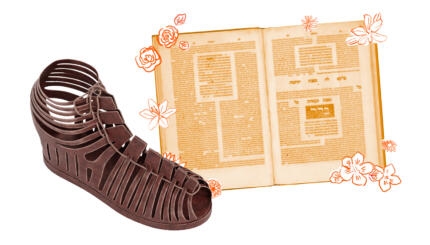Chapter eight of Yevamot begins with a mishnah about various kinds of kohanim (priests) who are prohibited from eating terumah, the food that was set aside for the priests and their families.
An uncircumcised priest and all those who are ritually impure may not partake of terumah. However, their wives and their slaves may partake of terumah.
You might be surprised that there are uncircumcised priests serving in the Temple at all. But it turns out that uncircumcised priests show up in other mishnahs too, making it reasonable to conclude this was in fact an issue. So we have to ask: Since circumcision is such a central commandment, how could it be that there were priests who were uncircumcised?
Rashi gives one possible answer: This is a priest whose brothers died from circumcision. If a priest had lost brothers to the procedure, it makes sense that there might be an inherited problem that endangers the lives of the boys in that family. (In fact, this possibility was discussed just a few days ago on Yevamot 64b, although not specifically regarding a priestly family.) Because saving a life supersedes the mitzvah of circumcision, the family justifiably declined to circumcise their other children. This seemingly didn’t disqualify the priest in question from serving in the Temple, but it did bar him from eating terumah.
With your help, My Jewish Learning can provide endless opportunities for learning, connection and discovery.
Rabbeinu Tam, Rashi’s grandson, suggests a different explanation: The priest in question was an apostate. In other words, he chose not to be circumcised for reasons other than health concerns. In a comment on a subsequent talmudic passage concerning an uncircumcised priest (Zevachim 22b), we learn the reason: He is afraid of the pain. One might wonder why he wasn’t circumcised as an eight-day-old child and now has to deal with the issue in adulthood, but we aren’t told anything further.
Regardless of the reason, the uncircumcised priest is disqualified from eating terumah. But others in his household aren’t similarly prohibited. The mishnah’s statement that his slave and his wife are allowed to do so means that the prohibition rests with him alone. Why is that?
We get a clue from the discussion the Gemara has been having over the last week about whether the wife of a priest may partake of terumah. The bottom line is that if the marriage to the priest is questionable for some reason, so is her right to eat terumah. If the marriage is acceptable, eating terumah is her right. It’s also the right of any enslaved people living in the priest’s household.
In the case of the uncircumcised priest, his actions (or lack thereof) prohibit him alone from eating terumah. But he is still a kohen, which means that everyone else in his household can continue to partake.
Read all of Yevamot 70 on Sefaria.
This piece originally appeared in a My Jewish Learning Daf Yomi email newsletter sent on May 16th, 2022. If you are interested in receiving the newsletter, sign up here.



